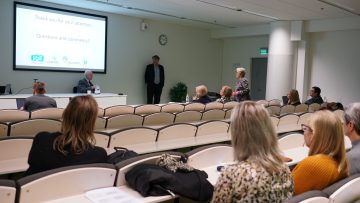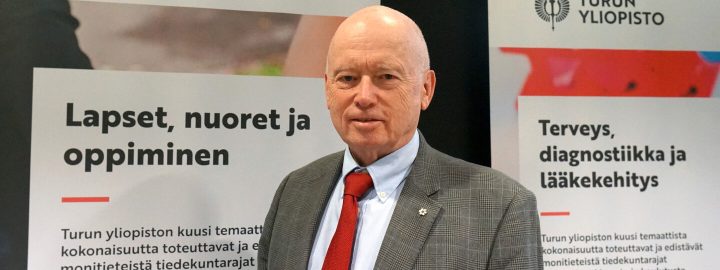Patrick McGrath uses top research to develop mental health programmes – currently in Ukraine
Patrick McGrath has worked devotedly for the improvement of psychiatry. He arrived to Turku straight from Ukraine to give a keynote speech in child psychiatric seminar.
Patrick McGrath, Emeritus Professor of Psychiatry at Dalhousie University, Canada, visited the University of Turku and gave a keynote speech at a seminar on 14 October 2023. McGrath’s speech was about remote parenting interventions and their potential.
McGrath has been studying digital psychosocial treatment possibilities that target the prevention of child mental health problems. He is also the founder of Canada’s Strongest Families Institute. Finland has integrated the Strongest Families® system as part of the healthcare services at 14 wellbeing services counties. University of Turku’s Research Centre for Child Psychiatry has brough the Strongest Families programme to Finland and developed it through research since 2009.
“The Strongest Families group in Turku has done an amazing job with transforming the parent training over 15 years. It gives parents better tools on how to help their kids – especially kids who are having difficulties”, praises McGrath.
McGrath compliments: “The Finnish health care system enables the children with behavioural challenges to get screened already at age four.” Working on the challenges early on makes it possible to build a trajectory of better learning, good development and social skills – instead of a trajectory of social and learning difficulties. In Canada, the health care system functions very differently. This is why McGrath and his colleagues founded the Canada Strongest Families Institute which offers the digital services for free to families who need it.
Parent training is both a treatment and a vaccine for the struggling families
“Parent training is both a treatment and a vaccine for children’s behavioural challenges. It fixes the behavioural problems but also starts a good cycle that effectively prevents the negative long-term outcomes of behavioural problems”, explains McGrath.
McGrath describes the current direction of Strongest Families as follows: “The Strongest Families system attempts to approach the possibilities of teaching parenting skills more broadly. Families are under a great deal of stress and Strongest Families has the possibility to provide them with better skills to manage daily life. Often when a child misbehaves, the natural instinct of a stressed parents is to be upset. Our training programmes focuses on the positive and building on the strengths of the child.”
“None of us work very well when we are only told what we did wrong”, elaborates McGrath.
The great part about parenting interventions is that they can target a large variety of behavioural challenges – both for the children but also for the parents. McGrath explains that the target problems can vary, for example, from sleep problems to post-traumatic stress disorder (PTSD). Parenting interventions can help families with multi-facet challenges such as anxiety, anger management challenges, and postpartum depression.
The Strongest Families programme’s parent training has also shown increase in parent well-being and work productivity. “If your child is angry and screaming at you as you leave for work, you will not feel good at work or be as productive”, states McGrath. In addition, providing parents with better tools can take some burden off the teachers who have previously used their time to control disruptive behaviour. A simple fix through parent training can therefore significantly reduce the costs for society.
According to McGrath, improving youth and adolescent mental health can be approached from two sides – the family perspective and policy perspective. When enough food, proper housing, safety, and stability are covered, the parents can focus on supporting the children’s development instead of worrying for the basic core needs of the family.
“We should invest in families because their well-being is an important part of the future”, urges McGrath.
The family perspective stems from a different view on parenting skills. “We need to accept that learning to be a good parent is like learning to be good at anything else. Someone might be good at a job naturally and some people might have more difficulties. Some kids are easier to parent and some kids are more difficult. Therefore, we should be providing the families with more support and recognition”, explains McGrath.

How to prevent childhood behavioural problems -seminar, speaker Patrick McGrath.
Professionals came together to support Ukraine through top science
Right before coming to Turku, McGrath made a research trip to Ukraine. Together with a group of experts, he was invited to Lviv to visit a health clinic for amputees and individuals with war trauma to develop a mental health programme for the people who were injured in the war and have had an amputation.
McGrath explains: “I put together a group of international experts and we created a proposal for the mental health programme. When the Ukrainian professionals accept the proposal, we will start collecting money in Canada for the development of the programme. It will be integrated into the Ukrainian health care services and the local professionals will start running it as well as own the programme.”
The mental health programme is built on some of the matters the researchers have learnt from the Strongest Families. Due to the shortage of the mental health professionals also in Ukraine, the programme will use coaches. There will be one coach for the family and one for the amputee.
“We have paid specific attention to monitoring the care. Even with good training, we still need to monitor that the work is done according to the guidelines and that there is enough support for the coaches as well”, describes McGrath. The access to the programme is digital and uses mainly video format.
“Ukrainians are digitally very capable and their literacy rate is higher than the literacy rate in Canada. Ukrainians have very strong family values and the people are very innovative and courageous. There are many strengths in the Ukrainian population, such as the incredible leadership in the face of this invasion by Russia”, notes McGrath.
“To better support war-impacted children and adolescents, we should use the best and the most up-to-date science as possible to find treatment possibilities”, tells McGrath. Many Ukrainians are suffering from post-traumatic stress disorder (PTSD) and McGrath says that there is not enough knowledge for example on children with PTSD. He is currently working with a research group from Brisbane, Australia to gather more knowledge and further improve the treatment programmes.
Lea Pulkkinen from the University of Jyväskylä was the second speaker of the How to prevent childhood behavioural challenges seminar. She spoke about the meaning of home for child well-being. The seminar was organised by the University’s Research Centre for Child Psychiatry, which is led by André Sourander. The Research Centre is an important part of the INVEST Flagship.
The Inequalities, Interventions, and New Welfare State (INVEST) is an Academy of Finland Flagship and a Joint Research Centre of the University of Turku and Finnish Institute of Health and Welfare. It aims at increasing well-being of Finnish society during childhood, youth and early adulthood and preventing psychosocial risks compromising such development through innovative interventions. INVEST aims at providing a new model for the welfare state that is more equal, better targeted to problem groups, more anticipatory as well as economically and socially sustainable.
Article was originally published in the web site of University of Turku.
Text and pictures: Veera Niemi

